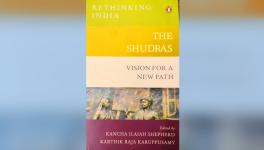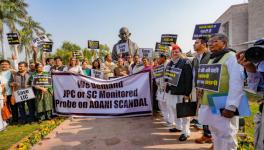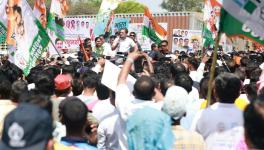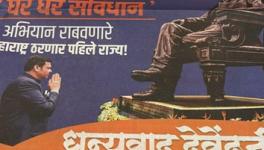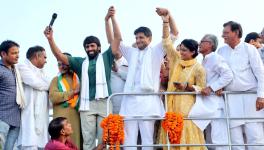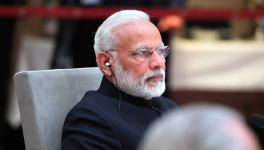Mallikarjun Kharge – Congress Gets an ‘Accidental President’
Image Courtesy: PTI
In a recent conversation, senior political scientist Zoya Hasan, who has studied and written on the Congress party for several decades, said that the party was faced with a three-pronged challenge: crisis of leadership, disarray in the organisation and ambiguity over its ideological orientation.
The ongoing exercise, not sure if one can call it so, of electing a full-time party president, after more than three years with a provisional head in the form of Sonia Gandhi, will not be able to address any of the three challenges.
The entire exercise shall not deliver on any of the fronts because the election of Mallikarjun Kharge – if at all it is held and Shashi Tharoor is not compelled to ‘voluntarily withdraw’ – is all but a certainty.
Despite Kharge’s amiability that is a trait common to several politicians without adequate political base, his dalit identity, his presence in politics for decades and various offices that he has held, the veteran will not deliver on any of the three counts.
The party requires a shakeup and Kharge is a status-quoist – after his ‘election’ he will qualify for being declared an ‘accidental president’.
After all, if it all Rahul Gandhi had not served a reminder to the Udaipur resolution calling for the principle of one-person-one-post as the party’s basic commitment, it would have been a contest between Ashok Gehlot and Shashi Tharoor.
The Rajasthan chief minister successfully pulling out of a race that he was never inclined to be a part of, and his continuance in office more or less being a ‘settled’ matter, has cast the spotlight on the Congress central leadership being neither ‘High’ nor in ‘Command’. With Kharge at the helm, even the make belief will be cast aside.
This stems from the fact that as a member of the ruling coterie for decades, Kharge, if he had genuine skills required of a party leader, would have influenced the Gandhis on the need for reorganising the party structure.
He did not also press for early organisational polls because Sonia Gandhi was hopeful that her son would relent and in such a situation, any party leader calling for an early election would have jeopardised his position.
Even as Leader of the Opposition in Rajya Sabha, Kharge had ample opportunity to present an ideological counter to the Bharatiya Janata Party’s Hindu Nationalistic narrative. As president, every action or decision would be taken after a quick mental assessment of how Sonia or Rahul Gandhi would react to it – will they be pleased or would they get riled with him?
This is hardly the recipe to get out from the morass the party is stuck in since 2014. But then, the Congress still remains the party where the interest of its first family is put above the party’s.
Inability of the Congress to overcome the three political challenges it faces will have a negative impact on efforts to forge an anti-BJP alliance across several states, attempts for which have been initiated by Bihar Chief Minister Nitish Kumar with the support of Lalu Prasad.
The electoral presence of the Congress across India can be listed under three different categories: states where the Congress is (or ‘used to be’ – the rise of the Aam Aadmi Party has diminished the Congress in Punjab and now the Arvind-Kejriwal-led party is making a strong bid in Gujarat and Himachal Pradesh) locked in a head-to-head contest with the BJP, states where the Congress has a fair-to-significant presence but requires tactical alliance partners to win seats, and states where the Congress has very little influence and is completely dependent on its allies.
For the anti-BJP front to be a potential challenge, it is important for the Congress to remain the main opponent of the BJP in states where the two are engaged in a direct contest. Gujarat, Rajasthan, Madhya Pradesh, Chhattisgarh, Assam, Uttarakhand are the principal states in this category.
These states account for a total of 110 seats, and I have consciously not included Punjab in this list due to the break in the three decades-old alliance between BJP and Shiromani Akali Dal coupled with rise of AAP, the defection of Amarinder Singh to BJP and because the Congress state leadership are rudderless currently. At the moment, it is unclear if the Congress will succeed in emerging as the principal challenger to AAP in this state in 2024.
A weakened Congress in these states, coupled with the emergence of AAP, will negatively impact the resolve of Nitish Kumar and other regional parties to accommodate the Congress in states where they are dominant players.
They will also have to consider if an alliance with AAP would be more beneficial because in the event of a good showing in Gujarat and HP, Kejriwal will emerge as a potential challenger, if not in 2024, but at least in the post-Narendra Modi era.
The Bharat Jodo Yatra has been hailed by supporters of the party for being able to re-introduce the political vocabulary of yore. But, this Yatra is going to be a long-drawn affair, continuing till early February, by when the country will be barely a year away from the campaign for the parliamentary polls getting underway.
It cannot be speculated at this stage if the Yatra is going to generate enough enthusiasm for the Congress to return to power in Karnataka (it is one of the three parties locked in a triangular contest and there is no knowing if Messrs Nitish Kumar and Lalu Prasad will prevail upon HD Deve Gowda and his son, HD Kumaraswamy, to partner the Congress and vice versa).
Rahul Gandhi’s Yatra has consciously chosen to avoid travelling through the main regions of political slugfest in the Hindi heartland and Western India where the Congress is challenger to the BJP. It is likely that the Yatra may alter Rahul Gandhi’s public image for the better, but still not get converted into electoral benefit for the Congress.
It cannot be denied that Gehlot avoided becoming party president because he did not visualise the party performing creditably in 2024. Even in Rajasthan, the killing of the tailor in Udaipur, supposedly in retaliation to the offensive comments by then BJP spokesperson, Nupur Sharma, the chances of the Congress returning to office in November-December 2023 has diminished.
As it is, the state has a tradition of voting the incumbent out and by that sequential logic, it could be the BJP that gets a shot at government formation. Furthermore, the AAP remains a potential force in the state, at least in urban areas, as voters look for a third alternative from the two they have alternately backed.
There is temptation to look at Tharoor as the ‘best’ president the Congress will never have. Despite his creditable electoral hat trick from Thiruvananthapuram and his being savvy, extremely articulate and ideological unequivocal, Tharoor’s appeal is limited to the middle-class.
The challenges the Congress faces are in the short run as well as in the long term. The ‘yield’ from this presidential election will not address any of the two challenges. This is eventually going to seen by historians of the future as an exercise aimed at silencing critics outside the party.
Peculiarly, the majority so-called G-23 group – signatories to the letter to Sonia Gandhi seeking organisational revamp among other initiatives – too have sided with the party establishment leaving out Tharoor, a signatory too.
Despite the clamour for change, even these leaders decided to kowtow to the real power within the party.
In 1922, Mahatma Gandhi’s arrest, despite his decision to call off the Non-Cooperation Movement, resulted in disintegration of the national movement.
In the debate that ensued within the Indian National Congress in its pre-Independence avatar, the party got divided into two groups: No-Changers and Pro-Changers. Eventually, the No-Changers had their way and Pro-Changers led by CR Das, Motilal Nehru, and Hakim Ajmal Khan had to give up their demand of ending the boycott of legislative assemblies.
No-Changers have once again won in the Congress proving that Jean-Baptiste Alphonse Karr, the French writer, was prophetical way back in 1849.
He had famously written -- “plus ça change, plus c'est la même chose”, the more things change, the more they stay the same…
The writer is a NCR-based author and journalist. His latest book is The Demolition and the Verdict: Ayodhya and the Project to Reconfigure India. He has also written The RSS: Icons of the Indian Right and Narendra Modi: The Man, The Times. He tweets at @NilanjanUdwin
Get the latest reports & analysis with people's perspective on Protests, movements & deep analytical videos, discussions of the current affairs in your Telegram app. Subscribe to NewsClick's Telegram channel & get Real-Time updates on stories, as they get published on our website.










